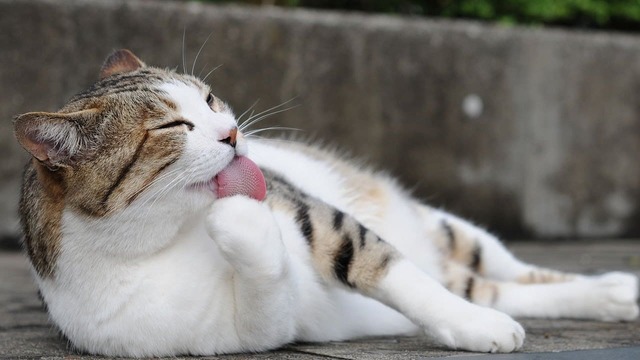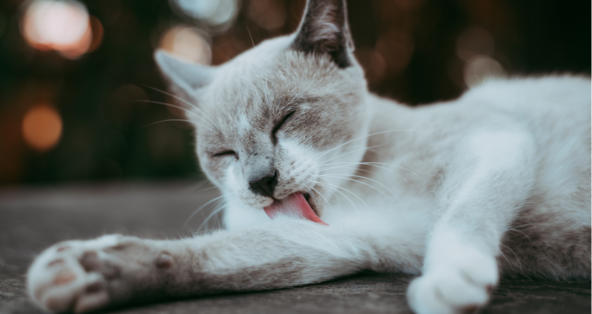Is your cat licking her fur excessively? Is your cat overgrooming? Have you noticed patches of broken or sparse hair or hair loss in areas?
Cats are cleanliness freaks and would spend almost 30% of their waking time in self-grooming. At any time if you would look at your cat you might find her grooming herself. She will be licking all her body, nibbling her paws and biting her nails to keep herself tidy.
If cat self-grooming is that normal a behavior, then how will you find out whether your cat is overgrooming?

How to Find Out if Your Cat is Overgrooming?
You can recognize a cat-over-grooming behavior by noticing a bald spot on your cat’s body caused by the breakage of furs. As a matter of fact, the cat starts licking herself to the extent that her furs start breaking.
Overgrooming is more commonly noticed in the Siamese, Himalayan or Burmese breeds, but it can be found in other cats too. The bald patches can occur anywhere on your cat’s body, still, the most common body parts where fur loss is seen are legs, belly or thighs where your cat can lick easily.
Self-grooming is a natural behavior in cats that they do for multiple reasons that include cleaning or lubricating their fur and self-calming in stressful situations, which is quite a frequent habit most of the time.
Nevertheless, an excessive cleaning behavior of a cat that leads to self-harm can be considered as over-grooming. But what could be the reason for your cat licking her fur off?
Why Does Your Cat Overgrooms Herself?
The main reasons for a cat overgrooming, as found in studies, are parasites and stress. Whereas, Psychogenic Alopecia, a psychological condition, is also one of the biggest reasons for excessive grooming in cats.
You will need veterinarian advice to diagnose why your cat is over-grooming. On your visit to a veterinarian hospital, the vet doctor will perform multiple tests like physical examinations or biopsy. The reports will help him find the relative issues listed below:
Medical problems may include fleas, ringworms, ticks, mites, bacterial infections or hyperthyroidism. Food allergy, constipation or urinary tract infection may also make your cat calm herself by over-licking.
If your cat is infested by mites or fleas you must get a proper flea treatment done. If you have other pets too, you need to treat all your pets as these parasites travel from one animal to another.
Environmental factors such as pollen and dust allergy, untidy litter tray, or change in meal timings can also make your cat upset. This will again lead your cat to over-grooming.
Psychological problems that cause over-grooming could be Trauma or Psychogenic Alopecia.
In case your cat is suffering from a stressful condition, the following could be the reasons for her to overgroom:
- Death of a family member or a furry friend
- Recently moved to a new house
- Change in the interior or furniture
- Change in the place of her litter box
- The environment is not peaceful
- Untidy surroundings
- Separation from a family member
Most of the time, a cat becomes stable in a few days after the impact of a stressful situation. But what would you do to stop your cat, if she keeps over-grooming for too long?
How to Keep Your Cat From Overgrooming?
Over-grooming mostly results from stress and environmental changes. Help your cat to fight these problems with love and care. You might need to visit a vet doctor to find an exact treatment for your cat’s over-grooming behavior. Whereas, you can follow any of these methods too:
Destress Your Cat With Love
It is a common behavior of a cat to self-groom for calming herself when stressed. In case of separation with a family member due to death or divorce, your cat might stay upset.
However, a reason for her stress could also be loneliness and lack of love from your side. Give her enough love, care, and attention to overcome the situation.
Do not scold your cat if she over-grooms as this action of yours will aggravate the problem.
Clean the Environment
As we know cats like their surroundings clean, your cat might be disturbed because of her untidy environment. An uncleaned litter box or unwashed food bowls could be the reason. Clean her dirty food bowls and litter boxes to make her feel comfortable.
Keep the Cat Entertained
If your cat’s behavior has changed due to boredom or a tragic incident, then you can try to keep her entertained. Buy her toys or puzzle feeder to play with or switch on the TV for her to watch.
Help her forget the incident by keeping her busy as much as you can. Spend more time with her, pet her, feed her, take her out for a walk and play with her.
Interactive games
Playing is the best destresser for pets. It will help your furball to get her confidence back and adjust to a new environment. Interactive games like mice chase or fish catch are the best games to keep your cats entertained and playful.
Use Pheromones
Pheromones are the chemical substances produced and released into the environment by mammals and insects. These chemicals affect the behavior of certain species like felines.
Try applying cat pheromones available in the market, onto some of your new furniture and furnishings. You can even get the best cat grooming tools for future use. This will help her getting friendly with the new surroundings.
Introduce Your Cat to Another Pet
Bring in a new pet, if your cat is frustrated staying alone at home. Another cat or even a dog can become an amazing friend with your cat. Once they get along well with each other, you will not have to worry about your cat. She will be happy playing with her furry mate when you will be staying out for long periods.
If you don’t want to bring another pet home, you may introduce your cat to other pets in your neighborhood. Once your cat gets comfortable she will enjoy playing with them. You may also drop her at a Cat Daycare Centre, before going to work.

What if Your Cat has Psychogenic Alopecia?
A cat sometimes cannot overcome stress and therefore to calm herself she keeps over-grooming for several days together. This could lead to hair loss and forming bald spots or sores on her body. Such a psychological condition can be termed as Psychogenic Alopecia.
This compulsive behavior that affects cats, in general, does not lead to any fatal health consequence. However, it definitely requires medical attention. Psychogenic Alopecia forms the most suspected cause of fur loss in cats.
Symptoms of Psychogenic Alopecia
- Baldness on belly, legs, flank, and chest
- Uncontrollable grooming, although a few cats only over-groom in the absence of owners
- Redness, sores or scabs on the bald areas
- Cutting her face with claws due to extreme agitation
- Skin wounds and ulceration caused by excessive grooming on the affected parts
This problem mostly results from chronic stress or a chaotic environment. It also develops in cats who exhibit a fearful or anxious tendency. Even after the source of stress is resolved the problem remains persistent.
How to Treat Psychogenic Alopecia?
To treat Psychogenic Alopecia you must take your cat to the veterinary doctor. He will perform the required tests to diagnose the problem and then prescribe treatments. The treatment might include some stress-relieving medicines and other precautionary methods to reduce stress and heal the wounds.
- The cat’s wounds and scratches need to be dressed regularly.
- The vet might suggest an anti-licking collar for your cat, which will reduce her frequency of self-grooming.
- You may remove the collar every day for a few hours to let her sanitize her wounds and enjoy licking.
- You can try making her wear cat clothes to stop her from licking off her belly furs.
Final notes
In contrast to other problems leading to over-grooming, Psychogenic Alopecia is uncurable, but its effects can be reduced. Proper care and treatment shall help your cat recover to some extent. Over-grooming is a result of stress in most cases. Therefore you must stay extremely careful in keeping your cats away from stressful situations.
Try to create a cat-friendly home and give her plenty of your time. Bring home friends for her to play with and take care of her hygiene by keeping the surroundings clean. Love is better than any other medicine for all our pets. Try to give sufficient love, care, and attention to your feline mates to keep them happy and healthy.

